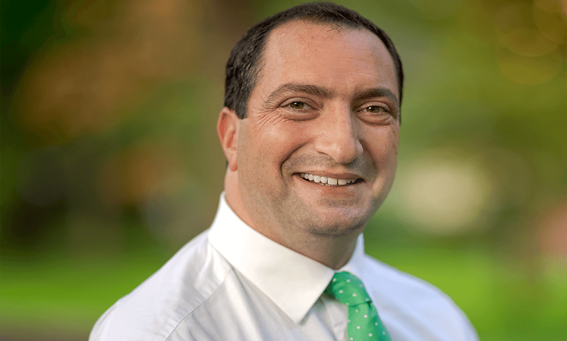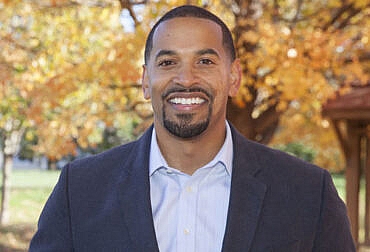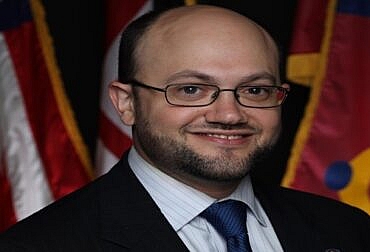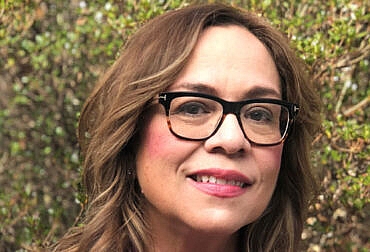Scott Goldberg is a dad, Democrat, attorney, and small business owner. He lives in the Four Corners neighborhood in Silver Spring with his wife, Dara, their 2 children, and 14 year old dog, Gus. He served as Montgomery County Democratic Party Chair, managed Ike Leggett’s last re-election and helped Jamie Raskin set up his first run for Congress. Scott went to the University of Maryland Law School at night and during the pandemic represented tenants pro bono in court. 15 years ago he started a small business in the county that currently employs 14 people. The interview covers topics of economic development, agriculture, jobs, transportation, affordable housing, home ownership, climate change and MCPS.
Economic Development:
Nagender Madavaram: Economic development is your highest priority. Can you explain what type of development you are proposing?
Scott Goldberg: I think words are important, so I like to say economic development and economic opportunity for all is incredibly important because it is how people can achieve a middle-class lifestyle in Montgomery County. That’s why it’s important, not just for businesses getting bigger for the sake of making more money. Montgomery County has both the perception and reality that we are unfriendly to business. So, for context, I started a small business with a laptop computer and a coffee table in my apartment 15 years ago. We’re a small residential property management business. Now we employ 14 people. We have our headquarters in Downtown Bethesda, and we’ve been able to navigate the business climate and dealing with Montgomery County. Our economic climate will get a lot better when businesses that are already here and when people that want to start businesses here can also grow. On the perception side, we have a lot of great things happening in Montgomery County.
I’m suggesting a branding to create an economic identity for the county called the Quad Hs. Those are; number one is hospitality. We have Marriott hotels, Choice hotels, and dozens of other hospitality companies right here in Montgomery County. By market share, we’re home to 50% of the hospitality companies in the United States of America but nobody knows that we don’t do a good job of selling it. The second H is healthcare. We’ve got the National Institutes of Health, Walter Reed Medical Center, the Food and Drug Administration and the hundreds of companies that are creating vaccines, drugs, therapeutics, advancing biotechnology. There’s a company called American Gene Technologies that is on the cusp of curing AIDS worldwide. That’s a pretty big deal. The third H is high tech. The County is home to the National Cybersecurity Center for Excellence and the National Institute of Standards and Technology. When the purple line is done, the University of Maryland, which is on the cutting edge of quantum computing, I think we’re going to be a major center of technology moving forward. And the fourth H is hops. That’s the ingredient in beer. We have a thriving craft brewery industry. It is great for entertainment and recreation. It is also great for land preservation because a lot of these breweries are agricultural production facilities and the property that they’re on is reserved for that purpose. If we can create just this identity around those four sectors, we will reverse the narrative that Montgomery County is not a great place to invest.
Agriculture:
Nagender Madavaram: I talked with farmers in the county and observed that they need slaughter house for cattle and goats. They are also looking for a warehouse to store vegetables. Producers of protein and produce need help. How do you help farmers in the county?
Scott Goldberg: When I was running for office, I never thought of knowing how cattle need to be harvested between 1,100 and 1,200 pounds. If there aren’t the facilities close by to do that, you’ve got to keep the cattle alive, and that costs a lot of money, and then the quality of the beef deteriorates. So, it’s a real issue, especially during the pandemic when a lot of these facilities had labor shortage. I’m the first person to acknowledge that I don’t know everything about everything. So, what I hear as a business person, my fellow business people have a real need. So, what I would want to do is meet with all the stakeholders, meet with all the people that need to use a slaughterhouse and decide what the path forward would be, and then work with them. If there are budgetary needs, the Council does have the final say on the budget.
I would imagine on a federal level; the Department of Agriculture has funds available. My guess is this would not be a big facility. I don’t know if it would be completely commercially viable but I bet the Department of Agriculture has funds or grants available that Congressman Trone, Congressman Raskin, Senators Van Holland and Ben Cardin could help to get funds. I’m sure there’s land use and zoning issues at the county level that would need to be addressed.
Jobs:
Nagender Madavaram: There is serious discussion about jobs in the county. There are two perceptions on this issue. One is, there are no jobs in the county but employers are saying we have jobs but candidates are not available. What is your stand on this issue?
Scott Goldberg: I am Montgomery County’s biggest cheerleader. I think we’re doing a lot of great things here, but that doesn’t mean we can’t do even better. So, in terms of employment, we have been relatively stagnant in private sector employees. I think that’s a pretty big issue because if we look at it as it relates to property as it relates to income taxes, the fastest growing demographic group is between the age of 65 and 74 which is mostly retired and not high taxable income group. We’re still going to provide them great services, just as we would provide to every person living in the county. So, we’re not making much income tax revenue. We’re not going to cut services or not to be able to add additional services as much as we’d like to. So, we need private sector job growth for higher wage jobs. Opening of the 4th campus for Montgomery College in the East County is an exciting thing and that’s going to be in a couple of years. That will be able to increase the knowledge of our workforce. We went from one to two vocational programs at MCPS in high schools. I think that trend is going to continue moving forward, so we’ll go from two to three from three to four. We’ll be able to train people who don’t need to go to college or don’t want to go to college but they can find a professional career.
Transportation:
Nagender Madavaram: Infrastructure of transportation is not developing on par with the demand. What do you propose to improve the transportation?
Scott Goldberg: I have a couple thoughts on transportation. The first thought is we need all of the above approach. We need transit solutions for sure where appropriate. We need road solutions for sure, but we also have to do non transportation things to solve our transportation problem. So, if you can reduce the number of miles traveled that people have to go to get places most of the time, it’s for work. So, if we can bring jobs into Montgomery County and if we don’t need to drive to Virginia or Prince Georges County or Washington DC and we work closer to home that will ease some of the strain on our transit system. Quite frankly, it’ll be cheaper. If we can move jobs closer to people that’s going to solve some of our problems. I do believe in constructing more transit, but there is no project that will be online in the next couple years. So, when people say let’s build the Red Line to Germantown, that’s a great idea. Let’s look at other options, maybe a monorail bus rapid transit network, the Flash network, the Corridor Cities and transitway. You know, the purple line, it is scheduled to open in the fall of 2026 then there are no projects that are coming online in next five to 10 years. So, I think we need to be honest with the residents of Montgomery County that traffic is going to be here for a while and we need creative and innovative solutions to fix it.
Affordable Housing:
Nagender Madavaram: Almost 70% of fire department personnel are living out of Montgomery County. Many workers in essential services are also living outside of the county. Affordability is a major issue. How do you address this problem?
Scott Goldberg: I love firefighters and the Montgomery County Volunteer Fire Rescue Association is supporting my campaign. When we talk about housing and affordability, firefighters on the professional side are a little bit different than the people. I want to fight for housing for nurses, teachers, and people who are not making exorbitant salaries. Firefighters work about 9 days for every 30 days, so they’re fine for the most part working and living further away from their firehouse. I really want to pay them more. I want to treat them better and I want to give them every benefit they can because everyone knows they need it. When we talk about people living in the county, it’s those working from morning nine to evening five almost daily basis. We really need to take care of them. So, how are we going to do that? I support creating inventory. I wanted to be honest with people, it’s not really going to lower prices. It’s going to lessen the increase of housing costs. Low-income group might not be able to afford all this new construction. The county needs to subsidize. I think that’s a moral responsibility because people deserve to have a roof over their head. If we want them to work here, I think we have a responsibility to house them here as well.
I am like huge fan of something called social housing. It’s referred to a couple different things more recently. The county government owns a ton of land. We’ve got libraries, schools, community centers and parking lots. County Executive Elrich put out a request for proposal for 19 different properties, he asked different developers. Tell us what you can do on this property, and I think those should be robust and vibrant. Housing options that are mixed. I think some of these units are going to bet at market rate. That’s how the economics work. Some of them are going to be at cost, so whatever it costs the county to build and operate. We’re not going to charge any profit, but people will be able to live there for what it costs. We’re also going to have low and moderate income groups properties. Our area median income is $108,000. If you kind of do the math, it roughly works out. Our minimum wage is 30% of the area median income, so we’re essentially building properties for what a minimum wage worker could afford.
Home Ownership:
Nagender Madavaram: Home ownership is another issue. How do you encourage people to have homeownership?
Scott Goldberg: We’re in a moment where more fortunate members of society want to help those who have been historically underserved. There is a company called Flock DC in DC. They’re a for profit business for one part of it and the owner, Lisa Wise has a nonprofit organization. They give grants to populations, historically underserved or discriminated communities who have never owned homes before. The African American community, the Hispanic Community, indigenous peoples basically qualify, if you have under a certain income, they will just give you a grant between $500 and $15,000. I think that is something that we can do in Montgomery County. Now the county has a lot of human resources to kind of help go through applications and give a nonprofit like this a space. I think there’s so much wealthier and there are so many people that want to make things right from a historical perspective. This is something the county should be partnering with a nonprofit to Shepherd law. Homeownership is the number one driver of generational wealth. So, if we can start people owning their own homes comfortably, we can create family wealth for generations to come. We can do it right here in the county.
Nagender Madavaram: Takoma Park City Mayor, Kate Stewart is implementing a similar program. She said the city government gives a grant up to $10,000 first time homebuyers.
Scott Goldberg: I do support government resources, but I think there’s enough private money out there. That we can fundraise and make this a reality also for the county. So, Tacoma Park doesn’t build a lot of properties and it can be an expensive place to own things. I just think Montgomery County and Tacoma Park can work together. We can have this program countywide, and since we’re constructing projects I think, there’s more opportunities for people to take advantage. There are more reasonably priced properties throughout Montgomery County than just in Tacoma Park. I mean they do a lot of innovative things with housing. Whatever is working for them will work for the county.
Climate Change:
Nagender Madavaram: Climate change another important issue. What do you think of it?
Scott Goldberg: I give the current county government a lot of credit for what they’re doing on a high level. So, we’re electrifying vehicles. We just passed a building energy performance standard measure. You know we’re doing a lot of things inside the county government, which is great. What I think, if you remember when John F. Kennedy said ask not what your country can do for you, ask what you could do for your country. I think, we need to ask all of our residents. You know, ask not what the climate can do for you. Ask what you can do for the climate. There are a lot of small things that everyone can do. For example, composting about 35% of all the garbage that residents should generate goes to the incinerator in Dickerson. So, a 3rd of what we’re throwing out is compostable, we can have curbside compost pick up, or we can encourage and educate people how to compost at their own homes and in multifamily properties as well. That’s a small thing that people can do. Most people’s garbage in Montgomery County is either privately picked up or it is part of their property tax bill. If you agree to use a smaller bin, I will charge you less money for your trash pickup. Would you, do it? I think a lot of people would do it. A lot of people would consciously figure out how just to produce less waste. It’s a financial incentive to create less waste. I think that would be successful. People can do things like rain barrels. You know electric cars is a big one. It’s expensive, but it’s something that people can do one day. I do want to work on making the bus transportation completely free. If it is free, I think more people would end up taking bus ride. We need to come up with about $10 million a year to make it working.
MCPS:
Nagender Madavaram: The county is giving 46% of its budget to MCPS. It is huge budget but there is a discussion about shortage of resources.
Scott Goldberg: A couple of things. You know, the state law can only fund the school system per pupil basis at the same level or higher each year. Most years, the MCPS requests a lot of money over and above that, so there is a little bit of a like an opportunity for negotiation, collaboration and leverage. Research indicates that individual and small group tutoring is the number one way to accelerate education. So, certain communities do not have as high-test scores as other demographic communities in the county. I think that’s a wrong that should be righted. So, at some point if I’m on the Council, the school system might say we need $2.7 billion this year, before that, I might enter into conversations and say, hey you know, let’s figure out what it would cost to get tutoring in high schools. Let’s catch these kids up on the reading level, math level and learning. How much would that cost? So, the school system can come and say, we need another $26 million to do that program for the schools. My job is to get the school system what they need to be successful, that means money. The school board is not responsible for going out into the community and saying we need a little bit more money. This is what we want to do.
Nagender Madavaram: Do you want to say concluding remarks?
Scott Goldberg: Absolutely, voters may have their mail in ballot already. Early voting is from July 7th to the 14th of July. The last opportunity to vote is Tuesday, July 19th. In the, At-Large race for the County Council, voters have a lot of great choices. They can choose up to four people. My view of public service is that I’m going to give 100% to being their At-Large County Councilmember for four, eight or 12 years. If the voters don’t elect me then I will go back to being a private citizen, pass my knowledge, wisdom to whoever they choose. I think these careers have life cycles. I think we’re supposed to leave everything out on the field for a period of time and then hand it off to other people. We’ve got fresh energy and possibly new ideas. That is the connection and level of trust that hopefully the people of Montgomery County will place in me. I commit to them that I won’t let them down.











